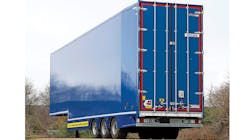Can the use of steel-skinned honeycomb core panels offer a viable solution to lowering costs, reducing emissions and increasing profits for US truck fleets? John Sewell of Belgium-based EconCore is convinced the answer is yes.
With cheaper fuel in the US, there is less emphasis on fuel efficiency and CO2 reductions than in Europe, but these are still important issues. Still, a technology exists today that can be used in the upper body structure of truck trailers that has the potential to deliver fuel savings, reduced emissions and through payload optimization, use fewer trucks to carry the same amount of cargo, according to EconCore, a technology provider.
“The shift to lightweighting is clearly present in the US but with a keen eye on the bottom line,” Sewell, business development manager for EconCore, said. “The main driver of change is economics. EconCore’s honeycomb technology is something I firmly believe is very attractive to the large fleets, because huge savings are there to be had.”
The technology, licensed by EconCore, is the continuous production of honeycomb sandwich materials. The fast, versatile, continuous process allows users to produce sandwich materials for applications including automotive, transportation and construction, among others, at low cost, weight and environmental impact.
The honeycomb core technology can help fleet owners reduce costs and increase competitiveness, EconCore contends. And there are some significant ecological benefits to be had, too, from major reductions in CO2.
As explained by Sewell, conventional trailers use a sheet and post arrangement. These are inexpensive but are prone to warping and have a relatively shorter working life. Another solution, which is more robust and lasts longer, is commonly known as a composite solution. These are steel-skinned panels with a foam polymer core, but can be heavy.
An EconCore-based solution is comparable in costs to a conventional composite solution, yet it is much lighter and robust, Sewell contends.
In Europe, testing has already taken place, using a Tata Steel product called Coretinium, which is approximately half the weight of an equivalent timber panel. This product uses EconCore’s honeycomb technology, under license.
“There is a perception that lightweight equates to low performance in terms of strength and robustness. This simply isn’t the case,” he said.
This state-of-the-art material uses the thermoplastic honeycomb technology in a steel-skinned sandwich and is suited to a broad range of applications.
“Within Tata Steel we have worked closely with customers to reduce the weight of commercial vehicle trailers, through the adoption of HSS (high-strength steels) in the main structural frame and landing gear,” Edwin Richards, Tata Steel’s Coretinium technical sales manager, said.
“While the use of HSS can make a big impact on trailer weight, we saw, especially on dry-freight box trailers, that there was still a lot of upper structure weight coming from the heavy plywood-based side walls and doors, for which we had no obvious solution. When we discovered EconCore’s technology we knew this could be the answer.”
Tata Steel supported a consortium, including UK trailer builders, as part of a 12-month Innovate UK-funded project in 2018-19. Four double-deck trailers were built and added to a supermarket fleet to monitor the fuel savings and CO2 reductions that could be achieved through lightweighting and aerodynamic design innovations.
The Innovate UK consortium was attracted to using Coretinium because, when compared to traditional plywood-based sidewall solutions, it typically saved over 35% in sidewall weight or 11 pounds per square foot, which equates to around 880 pounds over the complete trailer sidewall.
For a US fleet with an average 6,000 trailers, this could mean cash savings in the region of between $6 million to $12 million per year, depending on the journey type, according to EconCore
